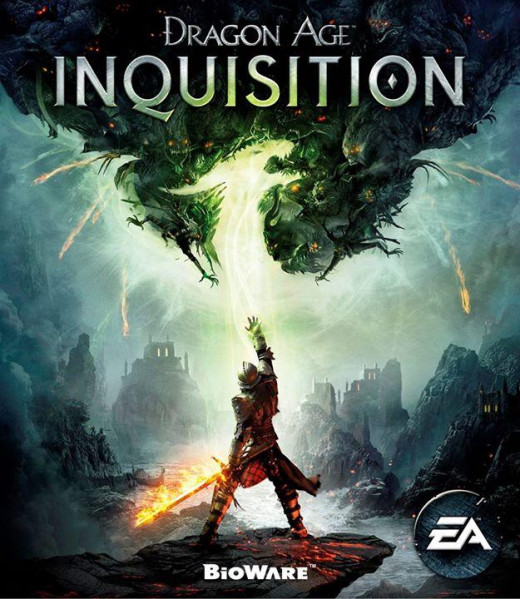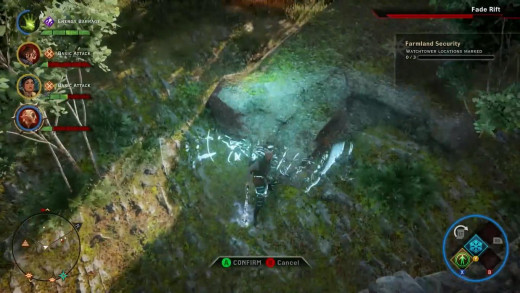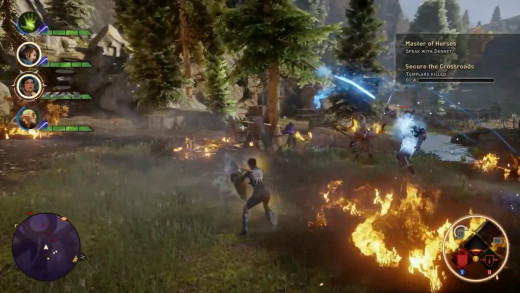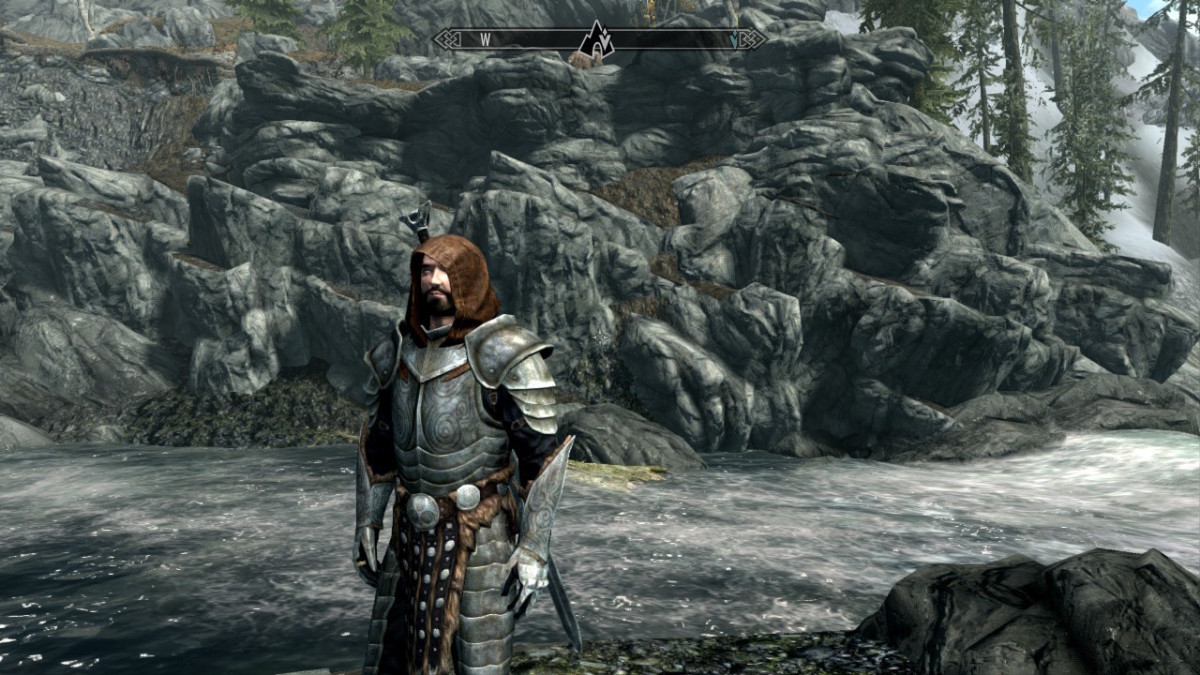Dragon Age: Inquisition - Review

To say that this is the biggest Dragon Age game to date would be an understatement. Hell, this is the biggest Bioware game to date. In terms of scale, you're better off looking at Elder Scrolls for a similar experience. Inquisition is Dragon Age at its most sprawling, and its most epic, filled to the brim with stuff to do and locations to explore.
Inquisition sets out to continue the story set out in the initial two Dragon Age installments. Starting off with a demonic portal appearing in the sky, Bioware are keen to make sure the stakes are high this time around. The entire world is in peril and only you can save it, this time from a horde of demons. For those that were disappointed with the low-key plot of Dragon Age 2, Inquisition feels suitably The Lord of the Rings, in comparison.
Set against this new threat is the Inquisition, a ragtag bunch of Templars, mages, and whoever else you can convince to join. Just as the story and tone aim to pull more from Dragon Age: Origins, the structure feels more akin to Mass Effect 2. A good portion of the game involves finding allies, convincing them to join, and/or solving smaller problems to ensure that people work together to stop the bigger threat. As the Inquisitor, it's your job to manage this organization.
It's also a clever way for Bioware to increase the scope of its game world. As always, Bioware do a solid job ensuring you're the hero (or anti-hero), at the centre of the story. This is a story that has you dealing with political manoeuvres, assassinations, and other-wordly threats. This is Dragon Age's canvas at its broadest, with both Ferelden, the country from the original two games, and neighbouring Orlais open for exploration.
A lot of this is handled with the war room back at your base. Each of your assistants can be sent out on jobs, be they simple things such as feeding and protecting townsfolk, to seeking aid from powerful royal families. Each character has their own role too; Knight-Commander Cullen handles your military power, making him handy when you need a show of force, whilst Leliana and her cohort of spies are better suited when discretion is needed. It's a fairly simple system but one that helps Bioware tell an even bigger story, with new missions popping up in response to your character's decisions earlier on. Take a hard line on mages for example, and you might find them stirring up protests in the countryside.

These open-ended assignments tie in with Inquisition's new quest structure, another radical departure from the previous games. Each area you can explore is vast and beautiful, with an abundance of settlements, ruins and caves to explore. Taking a leaf out of Ubisoft's book, Bioware throw tons of quests at you, which range from killing renegade Templars to finding a bunch of collectibles. There's hardly five seconds go by without another three quests popping up that can be completed. It's here though, where things start to feel a little off; there's plenty of quantity but not much quality.
Bioware seem happier this time around to have players traipse about collecting wool, leather and fur, or finding someone's cough syrup, than they do having you save the world. There's a somewhat hilarious disconnect between the character you're playing; a potentially god-like figure sent to save the world, and the actual missions you carry out. It's like reading the New Testament and finding out that, rather than turning water into wine, and walking on water, Jesus spent his time finding a new brand of tea for a random old couple; or watching Superman help an old lady across the road rather than fighting Lex Luthor.
There are some good side quests to be played, but the fact that you have to actually search through the chaff in order to find them is incredibly annoying, it's a lazy, rather shallow way of designing quests, with many having little feedback into the story. There's also the addition of fade-rifts, demonic portals that need to be closed once you've offed a set number of demons. Whilst there's plenty of Bethesda's influence here, there's just as many cues taken from MMO-style quests, which is odd for a developer famous for developing story-led RPGs.
The character creator has been given a good overhaul, now being much smoother to operate, with the ability to adjust minute details of your characters face. Along with usual choices of playing as a human, elf or dwarf, there's even the option to play as a Qunari this time round.
Each race comes with a slight advantage over the others, nothing major, but enough to perhaps push some players into choosing a particular play style. For example, dwarves cannot become mages, but come with bonus resistance to magical attacks, whilst elves are more resilient to long-range magical and missile fire, making the rogue and mage classes look more tempting.

More important is your character's class, and, like with the other games, your choice is divided between a warrior, a mage, or a rogue. Bioware have done a somewhat decent job making the skill-trees interesting. Roughly, each class can be developed two different ways; rogues get archers and dual-wielding assassins, whilst warriors get two-handed berserkers and shield-carrying types. The mage still remains the odd one out, and there's been a concerted effort, it seems, to try to wrangle some of the more problematic elements of the class that left it arguably overpowered in the other installments.
In a surprising move, the entire stat system has been done away with. Stats still technically exist, with different characters getting bonuses to constitution, strength and so on, but it's much more behind-the-scenes now. In fact, it's another hint that Bioware have taken just as much of an influence from other titles as they have their own games. This is very much an action-RPG, shaking off the last vestiges of the Dungeons and Dragons elements that the earlier games had. It's a potentially polarising move, but one that does, to a certain extent, fit with the other game's choices.
Even more surprising is the lack of a tactics menu. The previous two games had a pretty solid tactics system that allowed you to program responses for each of your characters. This gave you effective control of each of your party members, even when you weren't controlling them. This has been removed completely this time around, being replaced with a paltry "tactical camera". It's a poor replacement for what was originally a perfectly good mechanic. Whilst the A.I. in Dragon Age: Inquisition isn't the worst, there's always the sense that you don't have as much control over your characters this time around.
Speaking of characters, they remain a varied bunch. It's here where Bioware settle down to do what they do best. Highlights include Cole, a spirit/demon that wants to be human, and Dorian, a Tevinter mage looking to right the wrongs of his homeland. It's another clever way of having players rethink their enemy, much like Mass Effect 2 did with Legion, and shows that Bioware are still capable of some of the best character writing in video games. Likewise, the developer remains committed to writing characters with diverse sexualities, something which Inquisition continues to expand upon.

Sadly, the same level of writing wasn't devoted to the game's villain, Corypheus. Corypheus, comes across as little more than an inept cartoon villain, vowing revenge whenever you foil his latest plan. The previous Dragon Age games suffered from having nebulous threats such as the Blight, or the simmering mage/templar conflict of Dragon Age 2. Inquisition attempts to rectify this by giving us a Darth Vader-like figure we can hate, but he just ends up coming across as laughable.
Similarly the game's ending is something of a letdown. In order to enable players to continue playing past the credits, the game ends in an anti-climactic fashion. Nothing too drastic happens, nothing radically changes, everything stays essentially the same, all so that you're safe to carry on mopping up side quests long after the main campaign is over...just like Skyrim.
Of course, Dragon Age: Inquisition is so vast there's plenty that I haven't touched upon: the awkward crafting system and its terrible user-interface, resource gathering, base building and an abundance of glitches for starters. This is a gigantic game in terms of scope, but it stretches Bioware's skill at storytelling and game design so thin that it all starts to creak at the seams. It's an impressive undertaking by the studio, but it's by no means their best work.
For those that are perhaps obsessive-compulsive when it comes to side quests, Dragon Age: Inquisition will keep you sated for a long, long time. And for those that are desperate for a new RPG to play, Inquisition, will scratch that itch. But for those looking for a new Mass Effect or Baldur's Gate to lose themselves in, this isn't it. This is a beautiful, stunning game with tons to do, but it's also one that feels oddly empty.
It's big in scope, but rather short on soul.
Dragon Age: Inquisition was released on November 21st, in the UK, for PC, Xbox One, 360, PS4 & PS3.
This review is based on the Xbox One version.
© 2014 LudoLogic



